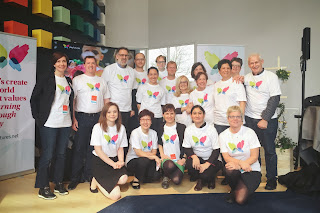 |
| 21st century skills |
This year’s LEGO
Idea Conference highlighted the most important issues around quality
education by revisiting two world famous oldies: Led Zeppelin’s Stairway to
Heaven and Give P’s a Chance (sic!) by John Lennon. While the former relates to
PISA results and equitable education systems, the latter refer to the 4 P’s of
a quality learning experience (projects, passion, play and peers). The event
was also the opportunity to launch the new PlayFutures network aiming at
creating a world that values playful learning, and EPA is a partner in. The
conference has come up with a ‘simple’ recipe for education reform: putting
children in the centre of change and making them feel it is good for them.
Kathy Hirsch-Pasek,
a Professor of Psychology from Philadelphia raised the most important
questions. What counts as high quality education depends on what you consider
success. As compared to traditional cognitive skills, most of the conference
and its speakers focused on 21st century skills, collaboration,
communication, content (learning to learn), critical thinking, creative
innovation and confidence. As compared to the traditional success-centred approaches
the importance of failure and retrying was also emphasised all through the
event. Professor Hirsch-Pasek as well as last year’s Idea Prize winner, Carla
Rinaldi emphasised that the goal of education is to support children to
become whole people who are responsible citizens as the key to a future to
mankind.
 |
| Bo Stjerne Thomsen |
Hanne Rasmussen, the Executive Director of the hosting LEGO
Foundation defined a quality education experience as one offering basic skills,
enjoyment in learning, learning to fail and retry, experimentation and
creativity, and as a result supporting children to become lifelong learner. As
for basic skills there is a need to define an absolute minimum that is really
needed for everybody, and on top of that we need to offer individual learning
pathways, always putting the child at the centre of learning.
Bo Stjerne Thomsen, when launching the PlayFutures network
called the attention to some often neglected facts. We sometimes forget that
well-being, feeling connected, motivation, encouragement and curiosity lead to
better academic achievements, too, imagination and creativity help in crises,
and early social behaviour predicts academic success and even employment.
 |
| 'Stairway to Heaven' |
Pasi Sahlberg, a
Finnish education expert, winner of this year’s Idea Prize not only drew a ‘stairway
to heaven’ by showing that good PISA results correlate with the level equity in
school systems (as compared to equality that does not have the same results),
but also tried a show-down on 4 myths and introduce 4 facts. It has been proven
that 1. competition, 2. standardisation and 3. frequent testing do not have
good results, and 4. digital natives are not necessarily better in
communication, thinking outside of the box and problem-solving.
Meanwhile it is
for fact that the following are characteristics of good learning: 1. active construction
of knowledge and learning, 2. accumulation, linking new things to old, 3. self-regulation
by controlling, understanding and reflecting on your own learning, and 4. cooperation,
communication and helping. According to him the teacher’s role in a 21st century school is surely to figure out what each individual kid knows and reach them accordingly. A tough assignment as compared to traditional lecturing and testing.
Jack
Shonkoff, Professor of Child Development from Harvard called the attention
to the traps in using the phrases ‘soft skills’ and ‘non-cognitive skills’ as
they may be degrading, while using executive function skills shows their importance
as the most essential for life. It was also underlined that play scaffolds
their development.
Mitch Resnick
from MIT Media Lab added the notion of daylong learning to lifelong learning to
his 4 P’s, emphasising the importance od bringing good out-of-school learning
opportunities into the classroom, instead of spreading classroom settings out
of school.
Phil
Fisher put the questions around evaluating innovative practices and the
problems around upscaling them into the limelight, two important questions for
the PlayFutures community that we hope we slowly grow in the months to come, to
be an open discussion forum for all researchers, practitioners (professionals
and parents alike) and policy makers in a year or so.
Rebecca Winthrop from Brookings Institute called the
audience’s attention to the freshly published Millions
Learning Report on scaling up quality education in developing countries.
 |
| Country reports |
At the end of the event the summary of outcomes of the
lively discussions in the context of 6 countries chosen for in-depth analysis
at the conference (Denmark, USA, Kenya, South Africa, Mexico and the
Philippines) was more or less unanimous:
- Child participation and child-led learning are key, even in the form of leading lessons,
- If we don’t have one destination for all children, we need to define a common set of minimum skills only
- It is still a major discussion point to clarify what is the purpose of education and what we mean by quality as a consequence
- Teacher’s role is essential (also in supporting parents in their role as educators), and so is the role of teacher training
- Play deprivation is spreading from the first world to third, mostly as a result of imposed academic pressure from both parents and schools.
 |
| PlayFutures Advisory Board and Staff |
This is the starting point of the new PlayFutures initiative,
that is aiming at a real change for the future of today’s children. To follow
its developments, indicate your interest on the website.

This comment has been removed by a blog administrator.
ReplyDelete